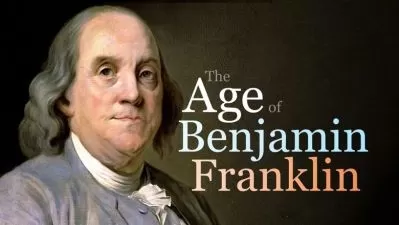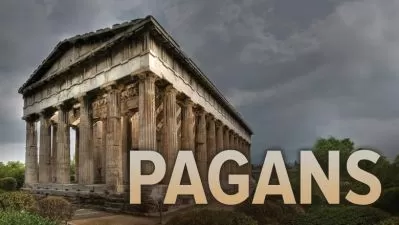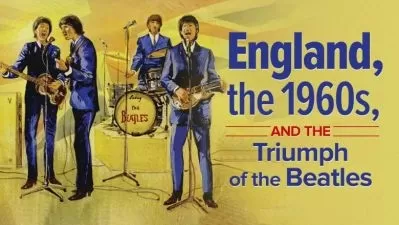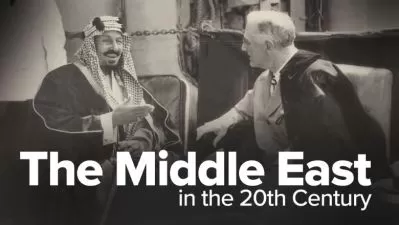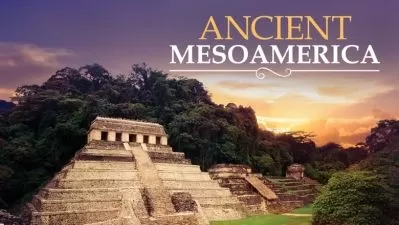Ancient Greek Civilization
Jeremy McInerney
12:03:34
Description
Why do the ancient Greeks occupy such a prominent place in conceptions of Western culture and identity? What about them made generations of influential scholars and writers view Hellenic culture as the uniquely essential starting point for understanding the art and reflection that define the West? Does this view tell the whole story?
The Ancestors of Us All
Clearly, the Greeks are a source of much that we esteem in our own culture: democracy, philosophy, tragedy, epic and lyric poetry, history-writing, our aesthetic sensibilities and ideals of athletic competition, and more. Blazoned above the portal of Apollo's temple at Delphi were the words, "Know thyself." For us, this injunction to self-awareness also commands knowledge of the Greeks.
With Professor Jeremy McInerney as your teacher, you'll come away with fresh knowledge on one of humanity's most golden ages. A native Australian, Professor McInerney is Associate Professor of Classical Studies at the University of Pennsylvania. He also serves on the Managing Committee of the American School of Classical Studies at Athens. He has excavated Greek sites in Israel, at Corinth, and on Crete.
Our customers are very enthusiastic about Professor McInerney. "The quality of the course is so high, I hate to see it end," writes one. Another says, "Professor McInerney's lectures are among the finest I have ever heard. He is articulate, thoughtful, and engaging. I learned more from this course than from any book I have read on the subject."
Our Mediterranean Origins
Spanning roughly 1,000 years, from 1500–400 B.C.E., this course covers the Late Bronze Age to the time of Philip II of Macedon and his son Alexander the Great in the late 4th century B.C.E. Professor McInerney traces the complex web of links between our present and its Mediterranean origins. With him, you explore ancient Greek civilization in the light shed by the newest and best research and criticism. The course expands understanding of history, literature, art, philosophy, religion, and more.
The lectures pay special attention to the two crucial centuries from 600–400 B.C.E.—the era of the Persian and Peloponnesian wars and of classical Athens as described in the histories of Herodotus and Thucydides and the philosophic dialogues of Plato.
Magnificent Minoan Crete and Mycenae
The first 12 lectures introduce you to Greek civilization from its earliest discernible beginnings up to the Persian War. In them, you learn to see ancient Greece split in two: a period of magnificent achievement that plunged to darkness, and a second flowering of that civilization that is the foundation of our own.
Minoan civilization on the island of Crete and Mycenaen civilization on the mainland were the two great Greek civilizations of the Bronze Age. They left behind magnificent ruins, art, and artifacts, but no written histories. In Lectures 1–8 you:
- Explore these extraordinarily advanced cultures
- Learn why their collapse around 1200 B.C.E. puzzles scholars to this day
- Hear the full story of Heinrich Schliemann, who found Mycenae by following clues in Homer's poems
- Review the finding made only in the 1950s that showed us that Mycenae was, in fact, Greek
- See how a new and distinct Archaic culture—one that revered Homer's epics—arose in the Age of Heroes after the collapse of Crete and Mycenae
- Discover how much the Greeks gained from their contacts with other ancient societies (the alphabet, among other things, came from the Semitic peoples of Syria and the Eastern Mediterranean)
- Understand how Spartan warrior culture was forced on the Spartans because they enslaved a nearby region
- Explore the causes and effects of Greek colonization from France to the Ukraine
- See how a uniquely "Greek" identity was based in part on the Oracle at Delphi and the Olympic Games; non-Greeks were not admitted to either.
The first section of the course examines the origins of democracy, which grew out of authoritarian government. And you see here how much of our freedom we owe to Cleisthenes, who created the democratic government under which Athens flourished for two centuries—and how he ingeniously designed it to undermine established power and allegiance.
The Persians, the Peloponnesian War, and the Arrival of the Macedonians
The course's second 12 lectures include the compelling histories of the Persian War (490–479 B.C.E.) and the Peloponnesian War (431–404 B.C.E.).
First united by their common enemy in Persia, Professor McInerney explains how much the Persian War came to define the Greeks—and us. The notion of freedom they developed in response to Persian power is one we inherit. After the Persian War, the Greeks developed their sense of identity as the antagonists of the Eastern world, a tension to which the West has been heir ever since.
After the defeat of the Persians, Athens rose to hegemony over the Greek world. You see how the Athenians' trade and power were developed and imposed on the Mediterranean. And you learn some surprising facts about this Golden Age:
- Greek tragedy began as a religious ritual to purge the audience of "uncivilized" emotions.
- Greek art was often an intensely and explicitly competitive enterprise.
- Athenian culture depended heavily on slavery. Professor McInerney addresses the charge that Athens only prospered because it had slaves under its heel.
Two lectures are devoted to the clash between Athens and Sparta in the Peloponnesian War. Socrates served as a soldier in that struggle.
After Athens was defeated, its philosophers rose to their full achievement in the work and lives of Socrates, Plato, and Aristotle, reinforcing the old axiom that defeat is the greatest muse for political philosophy. Professor McInerney delivers a provocative interpretation of the trial of Socrates.
In its postwar "decline," Athens defined the contours of philosophy and science for more than 1,000 years and produced great drama, art, and literature.
Toward the end of the 4th century B.C.E., Macedonian kings dominated Greece. Philip and his son, Alexander (who was tutored by Aristotle), created a Pan-Hellenic culture again to unite the Greeks against their common enemy—Persia.
In short decades, Greek power would extend from Egypt to the Hindu Kush.
Differences and Affinities
Just as the divide between East and West still exists, so does one separating our world from that of the ancients. We must remember that the Hellenic world had many values, beliefs, and mores at odds with our own. In ancient Greece:
- Slavery was common
- Women suffered complete exclusion from public life
- Homosexuality was an accepted aristocratic practice in Athens, Sparta, and other city-states.
As Professor McInerney shows, such differences do not imply that the culture of ancient Greece holds no meaning for us. Rather, it should spur us to deepen our engagement with the Greeks, for their differences can teach us as much as our affinities with them.
More details
User Reviews
Rating
Jeremy McInerney
Instructor's CoursesDr. Jeremy McInerney is Davidson Kennedy Associate Professor of Classical Studies at the University of Pennsylvania. Dr. McInerney earned his Ph.D. from the University of California, Berkeley. He was the Wheeler Fellow at the American School of Classical Studies at Athens and has excavated in Israel, at Corinth, and on Crete. He serves on the Managing Committee of the American School of Classical Studies in Athens, Greece. Professor McInerney's research interests include topography, epigraphy and historiography. He is the author of The Folds of Parnassos: Land and Ethnicity in Ancient Pholis, and has published articles in a variety of academic journals including Greek, Roman and Byzantine Studies, the American Journal of Archaeology, Hesperia, and California Studies in Classical Antiquity. In 1997, he was an invited participant at a colloquium on ethnicity in the ancient world, hosted by the Center for Hellenic Studies in Washington.

The Great Courses
View courses The Great Courses- language english
- Training sessions 26
- duration 12:03:34
- English subtitles has
- Release Date 2023/06/06






